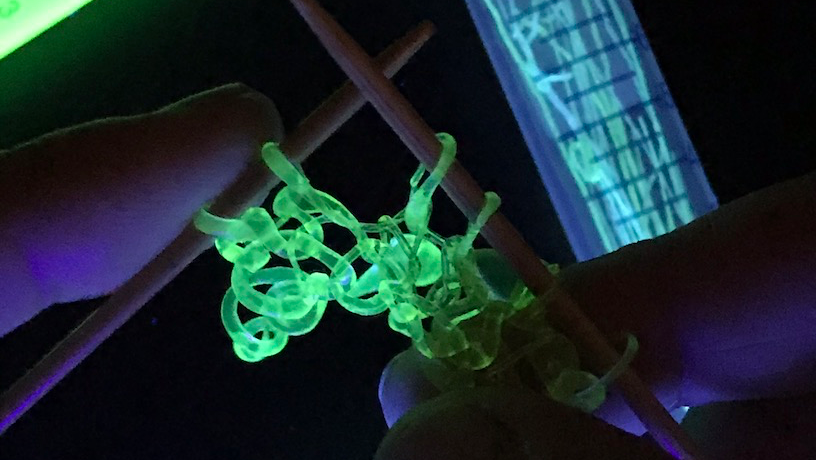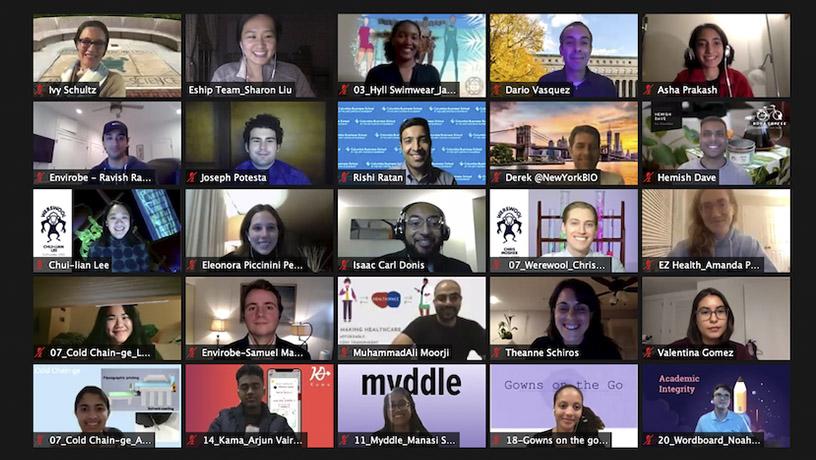Gone in 60 Seconds
Annual Fast Pitch competition celebrates concise entrepreneurship

Detail of biotextile fibers from Werewool, winner of the second place and recipient of the audience choice award.
With far-reaching proposals ranging from apps to apparel to adapting to the age of COVID-19, Columbia Engineering’s latest Fast Pitch competition proved to be its largest yet, drawing more than fifty startups from across the university. The face-off is an annual highlight of the School’s Entrepreneurship activities, and a key opportunity to practice for the larger Columbia Venture Competition in the spring.
Over a hundred hopefuls convened on Zoom November 19 to pitch before esteemed judges, competing for a piece of the $5,000 prize pool.
Taking top honors and $1,200 in the undergraduate track was first-year Kiana Mohammadian ’24 of Naperville, Illinois. Representing a team of four engineers, she pitched Iris, a system for notifying medical personnel without all the disruptive beeping. The project emerged from the Summer Design Challenges earlier this year, when her group started talking with nurses who’ve grown numb to the noise of alarms, which can also prevent patients from resting soundly.
“We designed Iris for a more comfortable environment for both nurses to work in and patients to heal in,” Mohammadian says of the concept, which combines a sensor with an app that notifies personnel on call without the need for audio alerts. “We’re planning to use the funds to build our first prototypes and test them in local nursing schools.”
Fellow frosh Albert Hao ’24CC, currently of Silicon Valley, won second and $800 for OnTrack, an AI productivity startup he launched in his junior year of high school. “Online distractions are a huge problem for students’ grades and mental health,” and eat up something like 55 days a year on average, he explains. “Our tools block distracting websites and improve study habits utilizing algorithms and web scraping.” In addition to helping users keep focused, the company also offers analytics to help parents and teachers monitor progress and optimize study sessions.
With the pandemic many of us can’t go into labs right now but it’s amazing how much you can learn just from prototyping in your kitchen.
Earning third and $400 was Cold Chain-ge, another enterprise that got its start at the Summer Design Challenges. First-year Anuva Banwasi ’24 pitched on behalf of her team’s four undergraduate engineers. They developed a concept for stabilizing vaccines in films that dissolve in the mouth after interviewing a nurse in Kenya who noted that her clinic struggles to keep conventional supplies constantly refrigerated at low temperatures.
The ambitious project had a humble start at Banwasi’s home in California, with a struggle to solidify a film to stably contain vaccines for universal delivery. “In my first several tries, I couldn’t get the film to dry,” she says. “After going back to the drawing board, I tried using a hair dryer instead of an oven, and it turned out that the fast-moving air was more effective. With the pandemic many of us can’t go into labs right now but it’s amazing how much you can learn just from prototyping in your kitchen.”
On the grad student and alumni track, the top finisher was EZ Health from an international group formerly of the School of International and Public Affairs who received $1,200 for developing a telemedicine platform connecting diverse patients with practitioners who speak their languages. Amanda Papir ’21SIPA made the company’s case, emphasizing both translation and curation of resources like pharmacies, medical histories and other information to be easily accessible in preferred languages, beginning with pilot programs in Spanish and Mandarin.

Over a hundred hopefuls convened on Zoom for the Fast Pitch competition.
In second place and also recipient of the audience choice award for a total of $1,000 was Werewool, a versatile protein-based biodegradable fiber for sustainable textiles. Fashion Institute of Technology (FIT) alum Chui-lian Lee pitched on behalf of her team of fellow FIT grads, biomedical engineering student Chris Mosher PhD’24, and FIT professor/Columbia research scientist Theanne Schiros.
Rounding out the winners roster was Envirobe, a startup sharing lab space in Brooklyn with Werewool. Sam Magaziner ’16CC, garnered $400 for metabolically engineered microbes that safely break down plastics for recycling. The experience, he says, was priceless. “Listening to others sculpt their solutions and build out their business plans has been invaluable in helping us rethink our own approaches,” Magaziner says. “Startup culture is a bit of a team sport in that manner.”
